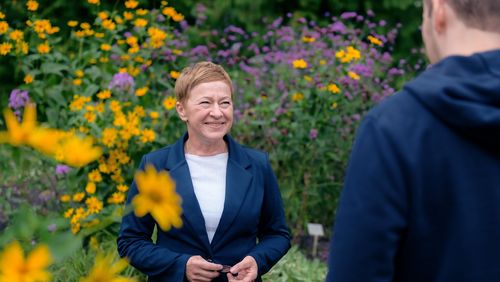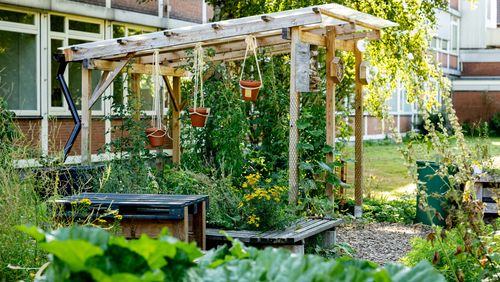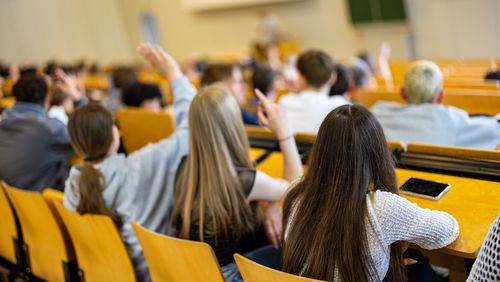Around 50 students from five schools have been working on their own projects around the pandemic. The university supports the projects in the teaching profile forschen@studium.
BigBlueButton instead of lecture hall, working on study essays in the student flat instead of the library, temporary financial support instead of a part-time job – the past months have been an enormous challenge for many students. And not only for them: Within a very short time, the new coronavirus has turned all our lives upside down. There is hardly any area of society that is not affected by the consequences of the lockdown and the continuing restrictions.
All of these changes open up many fascinating research questions, according to the team forschen@studium of the University’s Unit of Studies and Teaching. The teaching approach “forschen@studium” – in English “research@curriculum” – aims at fostering research-based learning already from the start of academic education. At the beginning of the summer semester, the team therefore invited students to apply for funding for research projects dealing with the corona pandemic. "We all have to deal with the consequences of the spread of the corona virus. Students can research the pandemic from very different perspectives - we want to support this," says Antonia Ley, coordinator at forschen@studium.
Under the auspices of the Vice-President for Instruction and International Affairs, Prof. Dr. Verena Pietzner, the university has provided a total of 100,000 euros for the corona projects. The students receive funding for material need for the research. Also, the university appoints them as student assistants for the project period until November. "In this way, some can compensate for the loss of their side jobs," explains Tanja Krusche, also from the team forschen@studium. A total of 27 student teams submitted proposals to the call for applications, 19 were selected.
Changing idea of ‘home’
The topics of the projects are as varied as the students' disciplinary backgrounds, which range from educational and social sciences, cultural studies, German studies and history to natural and health sciences: One of the teams investigates the role of social contacts in structuring everyday life when working from home, for example. Another group of students examines the extent to which the energy consumption of the university has changed during the lockdown. And yet another team looks at international students’ experience with the restrictions due to the pandemic.
Several groups of the international programme "European Master in Migration Studies and Intercultural Relations" (EMMIR) have been working on the concept of "home", for example: "During the pandemic, we were suddenly told to 'Stay home!' or 'Stay at home!’ At the same time we are far away from our families, our country of origin. We come from Mexico, Colombia and Guatemala," says student Alejandra Castellanos Breton. Together with Jose Guillermo Ricalde Perez and Lisa Marie Perez Sosa, she examines how the idea of 'home' has been shaped during the pandemic, especially for LGBTQI students.
Trying out new methods
Another EMMIR team is researching the situation of international students in Oldenburg. In particular, they are looking at the students’ experiences they have made "home-away-from-home" in the last few months. Both groups have already carried out their own research projects during their studies. For them, the call was a good opportunity to try out new, even more extensive research methods.
Jessica Schütz and Aileen Weichert applied for funding for a similar reason: The two Master's students have almost finished their studies in the subjects of Special Education and Ethics ("Werte und Normen") as well as Biology. They both fancy working on a PhD thesis after graduation. As part of their project, they have interviewed young people with special educational needs in the emotional and behavioural spectrum about their experiences in homeschooling. By doing so, they gained firsthand experience in conducting research and planning a project from the start until the end.
Gaining firsthand research experience
During the course of each project, university lecturers support and supervise the teams. This means that students who are right in the middle of their Bachelor's programme benefit in particular from regular feedback. Julika Hülsemann and Julius Greifenberg are amongst those gaining research experience: The second-year students are currently preparing for the upcoming Bachelor's thesis. Their aim is to find out how diminished social contacts affect students’ ways of organizing their daily life.
“Usually, course essays are primarily concerned with researching and reproducing research literature”, explains Greifenberg. "Now the challenge is to find a suitable research method." Hülsemann adds: "This is new for us: How do you design a questionnaire? And how can we ask the questions in such a way that they don’t become obsolete due to the dynamic development of the crisis?" In this process, the regular exchange with the supervisors had been a valuable support. "They gave us many helpful hints and discussed every step of the project with us," says Hülsemann.
The topics and challenges the teams deal with in their projects are indeed very different. But the students share a common goal – namely to conduct research and link current developments with the knowledge acquired in their studies to better understand the various consequences of the pandemic. Currently, the teams are on the home stretch with their projects. On November 26, they will present their results in an online poster session at the university’s Teaching and Learning Day ("Tag des Lehrens und Lernens").

![[Translate to English:] [Translate to English:]](/fileadmin/_processed/6/2/csm_coronavirus-4939242_1920_004029fb82.jpg)


